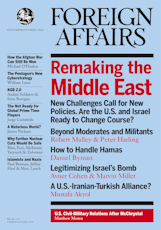Comment on Jorge Casañeda’s article in Foreign Affairs Magazine (September- October 2010)
http://www.foreignaffairs.com/articles/66577/jorge-g-castaneda/not-ready-for-prime-time
Castañeda fails to offer viable alternative to including emerging powers
Jorge Castañeda, one of Latin America’s foremost strategic thinkers, is right to point out that the inclusion of a group of emerging powers in today’s international institutions is unlikely to be the silver bullet for the global problems and challenges the world faces. He is also right to argue that India’s, China’s, Brazil’s and South Africa’s behavior in several areas has been far from constructive, namely in the realm of nuclear non-proliferation and global warming, where emerging powers conveniently put the responsibility on the rich countries.
Yet his argument against including rising powers in international institutions is based on spurious evidence, and his conclusion is short-sighted and fails to offer any viable alternative. Specifically, Castañeda is wrong on three counts.
First of all, he argues that established powers do more to support today’s institutions’ principles and practices- such as the collective defense of democracy, nuclear nonproliferation, trade liberalization, international criminal justice, environmental protection and respect for human rights. This claim is questionable and difficult to generalize. There are countless examples (some of which Castañeda himself quotes) that show that established powers such as the United States at times fail to promote good principles such as international criminal justice and environmental protection. Both the United States’ and the European Union’s refusal to reduce its trade barriers and high subsidies for domestic agricultural products, as well as the United States’ acceptance of India as a nuclear power show that established powers frequently act against the ‘spirit’ of international institutions. This does not mean that emerging powers are model students- quite to the contrary- but Castañeda’s claim that their entrance into the “inner sanctum” of the world’s leading institutions would have negative effects because they do not support their underlying values sufficiently is unsustainable, especially because China and Russia (two non-democratic regimes) are already part of the most important international decision-making body.
Secondly, Castañeda’s categorization of established powers vs. rising powers does not reflect today’s complex reality. He speaks of China and Russia as if they were non-established powers. Yet in the discussion about UNSC reform, both China and Russia are status-quo powers who reject India’s and Brazil’s call for reform. The group Castañeda calls “Emerging Powers” thus includes both established and non-established powers whose views on global governance strongly diverge, and it is difficult to make generalizations about their behavior.
Finally, Castañeda’s article fails to point to any viable alternative. It is true that Brazil, India and China need to rethink their strategy on how to tackle global warming. But that does not alter the fundamental truth that no sustainable solution on global warming can be reached without the active participation and leadership of Brazil, India and China. This includes granting them institutional status. It would be foolish to expect that emerging powers are more willing to engage constructively if they are kept out of the key decision-making bodies.
Including today’s emerging powers into established international institutions will be a messy process, but there is no viable alternative if we want to effectively address the most pressing global challenges.









